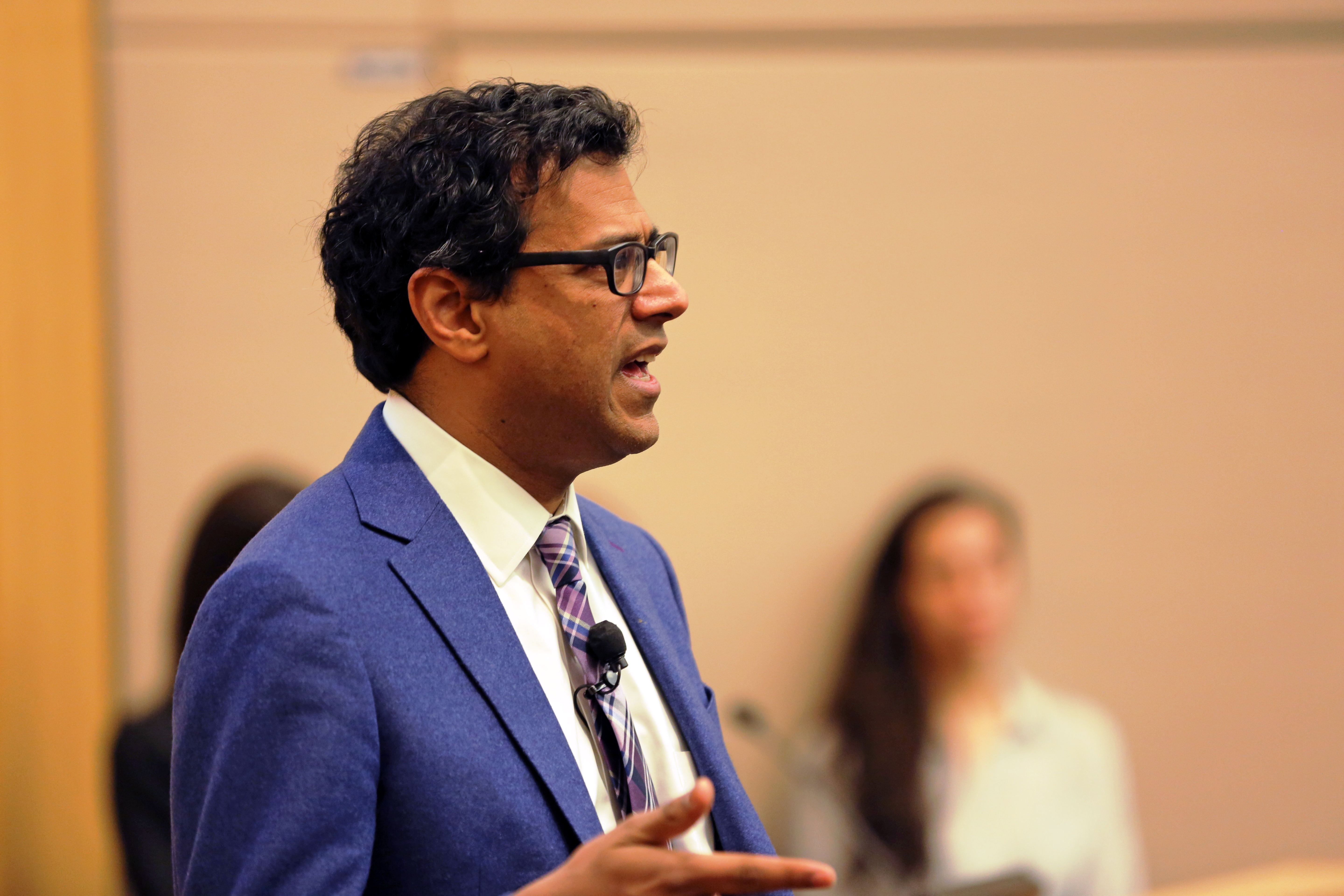Quality Rounds: Gawande on the Heroism of Incremental Care

Atul Gawande discusses incremental care during Quality Rounds.
How does medicine do its greatest good: through heroic interventions or steady, long-term incremental care?
BWH surgeon Atul Gawande, MD, MPH, spent more than a year trying to answer this question. His observations and reflections serve as the basis of an article he recently penned in The New Yorker. On March 9, the renowned surgeon, author and researcher spoke to BWHers about the topic during a Quality Rounds presentation, “The Heroism of Incremental Care,” in Bornstein Amphitheater.
In his talk and essay, Gawande discussed the value of “incremental medicine,” or gradually improving health over long periods of time.
“We have a certain heroic expectation of how medicine works,” he said. “We devote vast resources to intensive, one-off procedures, while starving the kind of steady, intimate care that often helps people more.”
Gawande interviewed physicians at the Brigham and observed patient appointments. He highlighted the work of Elizabeth Loder, MD, MPH, chief of the Division of Headache and Pain at BWH and BWFH, who sees patients at the John R. Graham Headache Center at BWFH, and Asaf Bitton, MD, MPH, and Katherine Rose, MD, of Brigham and Women’s Advanced Primary Care Associates.
Gawande followed the care of a patient seen by Loder for chronic migraine headaches. For four decades, the patient had suffered debilitating pain from migraines, and no clinician had been able to help.
“He’d seen every kind of doctor imaginable — neurologists, primary care physicians, holistic healers — he tried everything,” Gawande said. “I wanted to know what Dr. Loder does that gives her the ability to solve very difficult-to-solve problems. What does she do that’s different than what any of these other people had done for this patient? When I went in to observe, I thought to myself, ‘She must have some secret sauce.’”
But Gawande learned there was no secret recipe. Loder wasn’t pioneering a novel procedure or prescribing experimental drugs. Her “secret” was three years of regular visits to see what worked and, equally important, what didn’t. Loder eventually cured the man’s headaches.
What struck Gawande most was that Loder’s measured, long-term approach to care was so different from the way he functions as a specialist who’s focused on the “heroic save” during an acute intervention.
The Value of Relationships
Incremental care has had a significant role in lowering mortality rates, improving health outcomes and reducing medical costs, Gawande said. He noted, however, our health care system does not sufficiently value services that improve people’s lives over the long term.
“No one ever asks me to hurry up in the operating room,” Gawande said. “But, in the clinical setting, you wonder how many people you can see in an hour.”
When he interviewed physicians at Brigham and Women’s Advanced Primary Care Associates, he heard repeatedly that the relationships between them and their patients provide the most value in health care.
“When you see the same physician over time, you are much more likely to have a lower threshold for picking up the phone or coming in when you have a symptom that bothers you,” he said. “If you don’t know people in the system, there is a much greater likelihood that, if you’re feeling sick, you’re going to wait until it’s pretty bad.”
Studies have shown that when a patient knows a physician is easily available by phone or email, that alone leads to a longer life. Over time, these physicians are also integrating complex information about a patient’s medical history.
On the other hand, there often isn’t time during an intervention, such as a surgery or emergency, to discuss all of the external factors that contribute to a patient’s outcome.
“Dr. Loder, working with this patient, could understand over time what his insurer would cover versus other insurers,” Gawande said. “And that turns out to be just as important as having the right answer to whether or not you can get them the medicine they need or what the side effects from medication are.”
Looking Ahead
As science and medicine advance, and as people live longer, it will become evident that “life is a preexisting condition waiting to happen,” Gawande said. In other words, many people will be diagnosed with a chronic condition or disease at some point in life. Incrementalists can help patients manage those problems proactively, thereby lowering the chance that more expensive, high-risk procedures or complications arise later in life.
“We’ve actually reached the point where the value of incremental care has exceeded the value of interventionist care,” he said.
The value clinicians can create by getting ahead of health problems, rather than waiting for them to get worse, has risen and will continue increasing over the next decade, Gawande added.
“It’s now apparent that we can either give up on what has become an antiquated set of priorities and shift our focus from rescue medicine to lifelong incremental care,” he said. “Or we can leave millions to suffer and die from conditions that, increasingly, can be predicted and managed. This decision isn’t a bloodless policy choice; it’s a medical emergency.”
View the webcast.

Leave a Reply